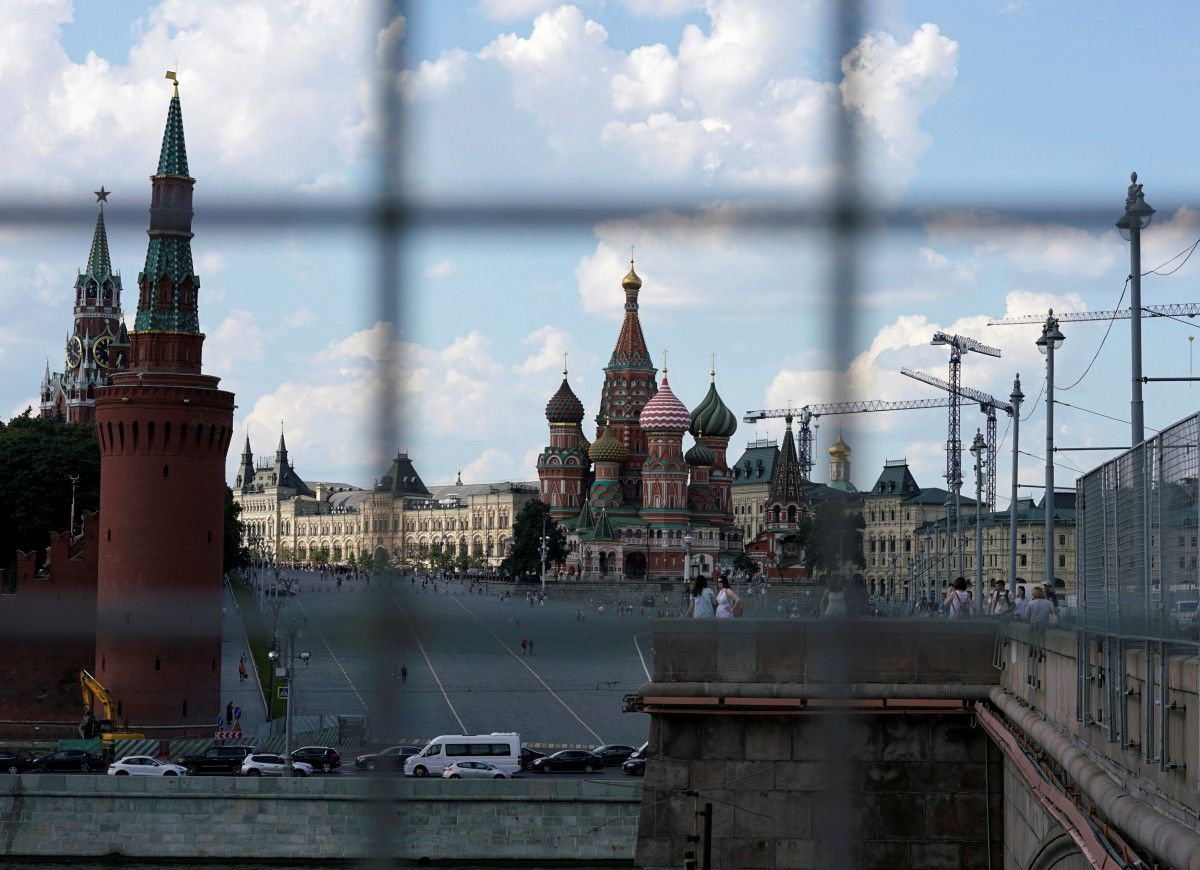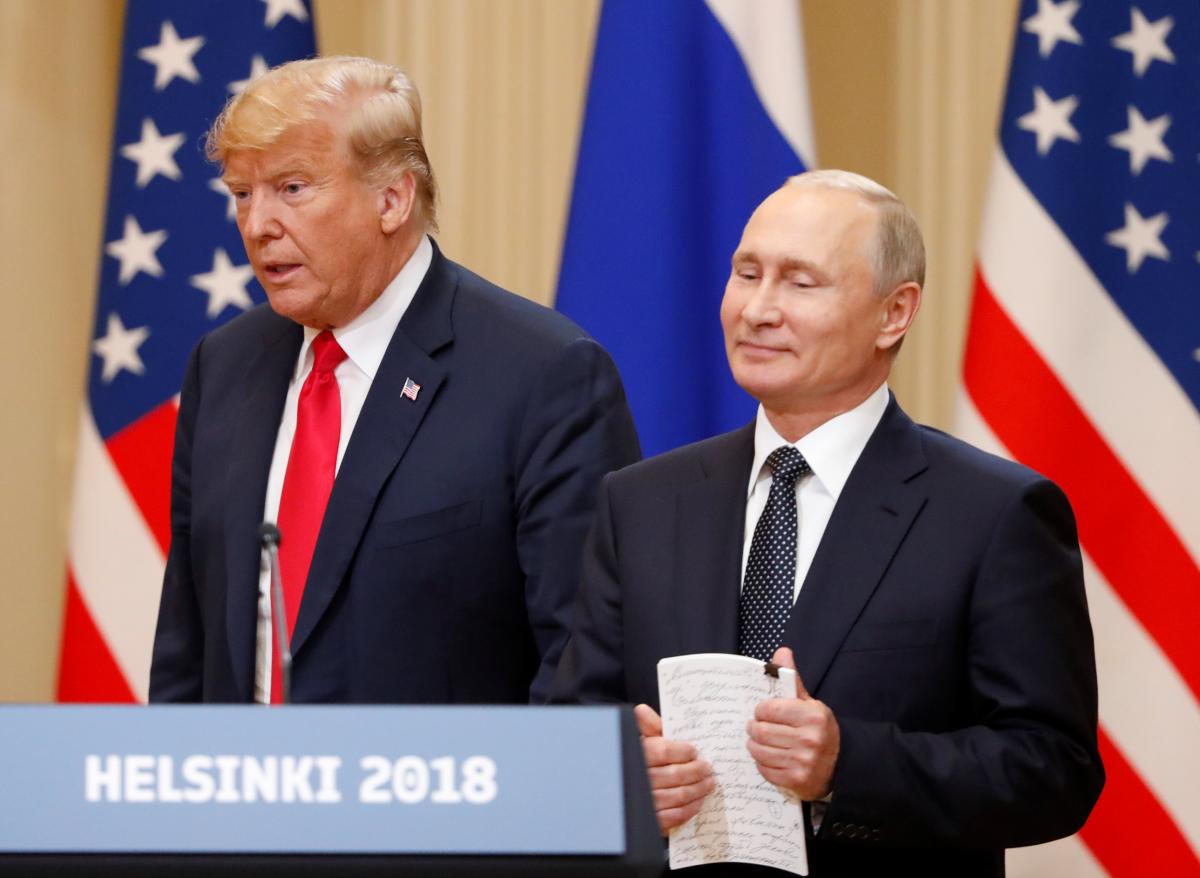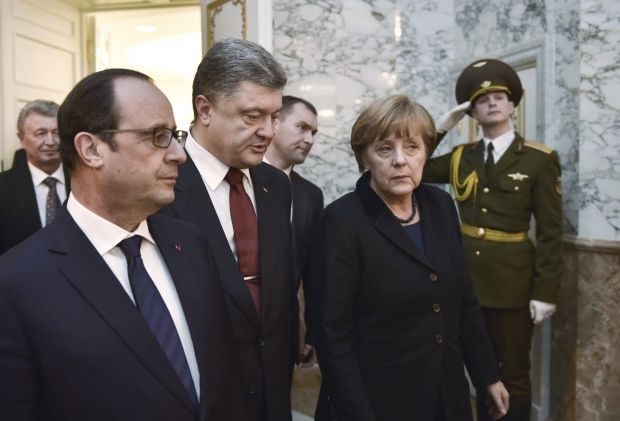
Kremlin's backdoor diplomacy
The latest meeting of the Normandy Four at the level of foreign ministers was held early June. It was announced that the Quartet's leaders would meet "in the near future." Now, almost two months since the top diplomats met, Russia is claiming there are no conditions for this. At the same time, Russia continues to discuss Ukraine behind its back, offering its own, peculiar vision of the Donbas "settlement."
A few days ago, Russian Foreign Minister Sergey Lavrov said there were no conditions yet for a new meeting of the Normandy Four at the highest level because the leaders' previous agreements on arms withdrawal in three eastern Ukrainian settlements, laid down in Minsk accords, have not been met. He added that the Normandy Four leaders meeting before these agreements are fulfilled would hurt the format's "reputation."
At the same time, he said, Germany and France as recently as last week expressed the idea of holding the highest-level meeting. However, Russia is not considering such an opportunity until the provision on arms withdrawal is fulfilled and the so-called "Steinmeier formula" starts working.
To see the absurdity of these proposals, it is worth recalling the essense of the "Steinmeier formula," put forward back in 2015 by the then German Foreign Minister. It proposes Ukraine to first give the occupied territories of Luhansk and Donetsk regions a temporary special status, and after the elections in "LPR" and "DPR" – to grant them a permanent special status.
Speaking of the pullback of weapons, the thing is that Ukraine has repeatedly stated: it can happen if ceasefire is observed in the area of Stanytsia Luhanska, but this was never achieved because of the Russian-backed militants constantly shelling Ukrainian troops and breaching the silence regime in every way possible.
Chronicle of secret talks behind Ukraine's back
In fact, if we analyze all Russian meetings held including with the first persons of the "Normandy Four" - French President Macron and German Chancellor Merkel, the picture looks rather grim for Ukraine: Russia is trying its best to make Ukraine an object of, rather than an actor in the negotiations.
The latest meeting of the Normandy Four at the level of foreign ministers was held on June 11. There the top diplomats discussed the prospects for holding a meeting of the Quartet leaders in the near future, as well as deploying the UN peacekeeping mission in Donbas. Moreover, Lavrov already stated at the time that during the meeting the sides had found no common ground "on the sequence of implementation of steps under the Minsk agreement."

The next step was the Helsinki summit of Russian President Vladimir Putin and U.S. President Donald Tramp, where the Kremlin chief was no longer willing to exchange diplomatic pleasantries and defend the sequence of steps under Minsk. He allegedly directly voiced the idea of holding a referendum in Donbas. In particular, Russia's Ambassador to the U.S. Anatoly Antonov said that Trump and Putin had discussed "concrete proposals" for the settlement of the conflict in eastern Ukraine. In response, the U.S. National Security Council stated that they were "not considering supporting" Putin's proposal for the referendum, while the Ukrainian Foreign Ministry "strongly rejected" the idea.
As a result, Russia gradually began to tilt the angle of negotiations from the discussion on UN peacekeepers to the idea of a referendum in Donbas. In particular, according to the State Secretary - Deputy Foreign Minister of the Russian Federation Grigory Karasin, this issue was to be the subject of discussion at the meeting of the political directors of the Normandy Four's foreign ministries late July.
Apparently, to prepare the ground for such talks, on the eve of the meeting of political directors, Russian President Vladimir Putin asked German Chancellor Angela Merkel to meet Russian Foreign Minister Sergey Lavrov and Chief of the General Staff of the Russian Armed Forces Valery Gerasimov. There have been no leaks on what exactly Russia's arguments were in those talks. "The conflict in the east of Ukraine was discussed," the government of Germany said in a dry comment.
But that was not all… After an unexpected meeting with Merkel in Berlin, Lavrov and Gerasimov were also received by French President Emmanuel Macron. Once again, it was Putin who asked Macron to meet his men. The details of these "negotiations" also remain a mystery under lock and key. Macron's office resorted to only acknowledging that the conflict in eastern Ukraine had been discussed.
Referendum move did not pass, for now
It seems that so far, Russia has failed to push through their vision of the Ukraine conflict "settlement" by holding another pseudo-referendum in Donbas. The day before the meeting of the Normandy Four foreign ministries' political directors, OSCE special envoy for Ukraine and Tripartite Contact Group in Minsk, Ambassador Martin Sajdik stated that the topic of discussion would be "possible involvement of UN forces to resolve the conflict in the east of Ukraine." Nothing was mentioned of any other scenarios.
Sajdik's words were repeated the same day by U.S. State Department's special representative for Ukraine negotiations, Kurt Volker, who said that the meeting would discuss the shape of the UN peacekeeping operation. He recalled that, unlike Russia's proposal to have the mission only protect the OSCE monitors, the U.S., Germany, France and Ukraine stress there should be a real peacekeeping force to ensure security at a broader level.
According to Volker, despite the fact that the U.S. is not part of the Normandy Four, he maintains close contacts with his colleagues from France and Germany. He added that he would soon talk with his Russian counterparts to convey certain ideas to them, and reiterated the need for Russia to withdraw troops from Donbas for the UN mission to be a success.
Actually, the political directors' meeting on July 26, made it clear that the Russian ploy with the referendum did not pass. "Despite the existing disagreements with the Russian side, representatives of Ukraine, Germany, France and Russia agreed to continue their work on defining the basic principles of the UN peacekeeping operation in the conflict zone," the Ukrainian Foreign Ministry said following the talks.
Why Russia needs backdoor diplomacy
However, despite the fact that Russia's new ideas of Donbas "settlement" have not been supported, the topic of the Russia-style referendum is unlikely to be completely removed from the agenda. In this regard, the meeting of the Normandy Four heads of state has no clear prospects. According to a senior researcher at the Institute of World History of the National Academy of Sciences of Ukraine, Maksym Yali, since Putin announced this proposal at his meeting with Trump, he will continue to try to resolve the issue directly with the U.S. president. "The Kremlin's main goal now is to exclude Ukraine, France and Germany as participants in the Normandy format from taking further decisions, as their position - to act under the Minsk agreements - is unacceptable to Russia. The referendum is rather a smoke screen, because initially it was clear that neither Ukraine, nor international partners will go for it," the expert believes.

Putin seems to still harbor some hope in President Trump, despite the negative reaction to the Russian proposal for a referendum in Donbas from the American establishment. No wonder former U.S. ambassador to Ukraine, John Herbst, stated that Moscow could expect Trump, himself, would be more willing to offer some concessions.
In favor of this view speaks the fact that after Trump's adviser John Bolton said that Putin's visit to Washington is postponed until 2019, Trump immediately received from Putin an invitation to come visit Moscow himself. And curiously, White House Secretary Sarah Sanders rather clearly hinted at Trump's openness to suggestions.
In other words, the Kremlin still has some hope to agree on Ukraine with Trump. Moscow does not actually need any meetings in the Normandy Four format, where Putin's proposals are seeing no support. And, unfortunately, Europe cannot restrain these impulses of mutual affection between Putin and Trump.
According to Oleh Bielokolos, the director of the department for international bilateral relations at the Maidan of Foreign Affairs Foundation, Europe had high hopes for negotiations in the Volker-Surkov format, after which everyone could be able to reach some agreements with Russia and where the issue of the introduction of UN peacekeepers was discussed, but now the issue is postponed for an indefinite period. "Oddly enough, all negotiations are now going on without any communiques, statements; some kind of backdoor diplomacy is being observed, which leaves room for speculation. Russia is exploiting this and, instead of making some statements, refers to the Minsk process, on which there has been very little information recently," Bielokolos said.
Speaking of Minsk, Russia continues to pedal the issue in the vein of Ukraine "failing to fulfill" the agreement. According to a political scientist, candidate of political sciences Olesya Yakhno-Bielkovska, there is a high probability that behind Kyiv's back, the Kremlin has been promoting the idea that Ukraine is an unreliable partner. This gives Russia a few trump cards. First, it's about gradually pushing Ukraine away from the negotiation process. Secondly, it's about delaying negotiations, let them be in the Normandy format, until next year's presidential elections in Ukraine (hoping for a comeback of pro-Russian forces).
"The only ultimate goal of all maneuvers is to force Ukraine to fulfill the political part of the Minsk agreements and introduce changes to our Constitution. Now, they will be offering variants that are initially unacceptable for Ukraine, that's only to make the implementation of the political part of Minsk deals seem acceptable. And now, through direct negotiations with Trump, there will be attempts to inflict pressure on Ukraine leadership to start its implementation," says Maksym Yali.
According to the expert, the Kremlin is seeing help in this matter from the fact that Trump, with his aggressive policy, compels to make some compromises, including on Ukraine, France and Germany.
However, experts cannot be sure that further developments will be only in favor of Russia. Firstly, that's because the date of the new Trump-Putin meeting has not been set yet. Secondly, it is difficult to guess the effect of the Russia meddling probe. U.S. special counselor Robert Muller intends to publish the investigation results before September 1.
Anastasia Zaremba

